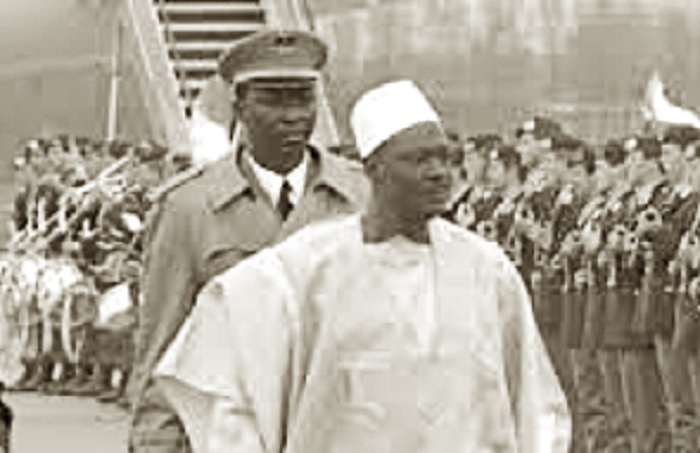After leading a coup against a democratically elected government, junta leader Colonel Assimi Goïta has attempted to rehabilitate the image of military government in Mali.
A military coup on August 18 led by Colonel Assimi Goïta has again pulled Mali into the orbit of military rule. This builds on a long legacy. Mali has had four coups since independence in 1960. A military government or a former military leader has served as head of state for 35 of its 60 years as an independent country.
The junta’s Transitional Charter once again promotes a central role for the military in Mali’s political affairs. Among other points, the Charter stipulates the junta’s judicial immunity, the Charter’s supremacy over the constitution, and the future place of the junta in a transitional government.
Since the coup, Colonel Goïta has repeatedly engaged in public ceremonies to rehabilitate the perception of military governance. Shortly after taking power, Goïta sought counsel from former military dictator Moussa Traoré during a public visit to Traoré’s residence in Bamako. During Mali’s Independence Day ceremonies, soldiers greeted and welcomed the former 2012 coup leader, General Amadou Haya Sanogo. Over 400 officers received rank promotions as part of the ceremony.
The celebration of Mali’s coup leaders obscures the disastrous performance of Mali’s previous military governments.
Mali’s History of Coups, Rewarding Coup Leaders, and Military Governance

1968 Coup
November 19, 1968 – Lieutenant Moussa Traoré leads a military coup that ousts President Modibo Keïta. During his rule, Traoré promotes himself to the rank of general, ruling over Mali’s first military junta and later a single-party regime.
Under single-party rule, Traoré established a highly repressive regime that routinely opened fire on protesters and eliminated rivals or those that dared to voice dissent. Traoré’s regime was likely responsible for the killing of thousands of Malians. After his ouster, Traoré was tried and convicted for the killing of at least 200 protesters in March 1991. He was later pardoned for his crimes by President Alpha Oumar Konaré in 2002.
Economic growth during Traoré’s rule was anemic with economic contraction recorded in 11 of the 23 years he held power.
Corruption ran rampant during Traoré’s time in power. After he was forced from power, investigators with the State Asset Recovery Initiative of the World Bank and the United Nations Office of Drugs and Crime helped recover millions in stolen funds from Traoré’s Swiss bank accounts alone.
1991 Coup
March 26, 1991 – Following student-led protests that were violently put down under Traoré’s orders by the military, Lieutenant Colonel Amadou Toumani Touré leads a coup removing Traoré from power. Touré becomes interim head of state and de facto leader of a transition to multiparty democracy in Mali. Touré steps down from power following the election of civilian, Alpha Oumar Konaré. Touré is subsequently promoted to the rank of general.
1992-2002
President Konaré serves two terms overseeing steady economic growth, respect for civil liberties and political rights, and reforms of the security sector. Mali becomes a founding member of the intergovernmental Community of Democracies in 2000.
2002-2012
May 12, 2002 – General (retired 2001) Amadou Toumani Touré wins presidential elections as an independent candidate, largely due to his continued celebrity from the 1991 coup d’état. Touré is re-elected in April 2007 to a second term. During his time in office, perceptions of high-level corruption expand, and key government institutions, including the armed forces, deteriorate.
2012 Coup
March 22, 2012 – Captain Amadou Haya Sanogo leads a coup weeks prior to elections, forcing Touré to resign. Sanogo establishes a military junta to rule Mali. Mediation efforts with ECOWAS result in a deal in which Sanogo agrees to cede power to Dioncounda Traoré as an interim civilian president until the organization of elections. The junta, however, remains in place and routinely threatens interim leaders. During this period, northern Mali becomes occupied by militant Islamist groups, a development that plunges the larger region into a crisis that remains to this day.
August 11, 2013 – Ibrahim Boubacar Keïta, a longtime political opposition leader wins run-off presidential elections with 78 percent of the vote. Three days later, Captain Sanogo is promoted to rank of general.
November 27, 2013 – General Sanogo is arrested and charged with the abduction and disappearance of 21 Malian paratroopers. The paratroopers had attempted a countercoup against Sanogo at the end April 2012. Their bodies are discovered in a mass grave in December 2013. On January 28, 2020, Sanogo is released on bail pending trial, the date for which has been postponed to “keep concord within the army.”
August 16, 2018 – Keïta wins re-election with 67 percent of the vote in the second round of presidential elections.
2020 Coup
August 18, 2020 – Colonel Assimi Goïta leads a coup ousting President Keïta from power and installs a military junta. Initially, the junta proposes to remain in power for a 3-year military transition. This proposal generates sharp domestic opposition and international condemnation.
September 12, 2020 – The junta produces an interim governing Transitional Charter which maintains the junta’s role in Mali’s political affairs.
“The celebration of Mali’s coup leaders obscures the disastrous performance of Mali’s previous military governments.”September 22, 2020 – In defiance of ECOWAS’ demand that the junta cede power to a civilian government, the junta names Colonel Major (retired 2012) Bah N’Daw as interim president and junta leader Colonel Assimi Goïta as interim vice president. N’Daw served as aide-de-camp to Moussa Traoré until 1990 and chief of staff of the Air Force under Touré in 2004. He retired in 2012, then served as minister of defense under Keïta from 2014-2015. The position of vice president is responsible for overseeing the country’s armed forces and national security institutions and would replace the president if the incumbent were unable to fulfill his duties for any reason.
September 25, 2020 – N’Daw and Goïta take their positions in the junta-installed transitional government.
